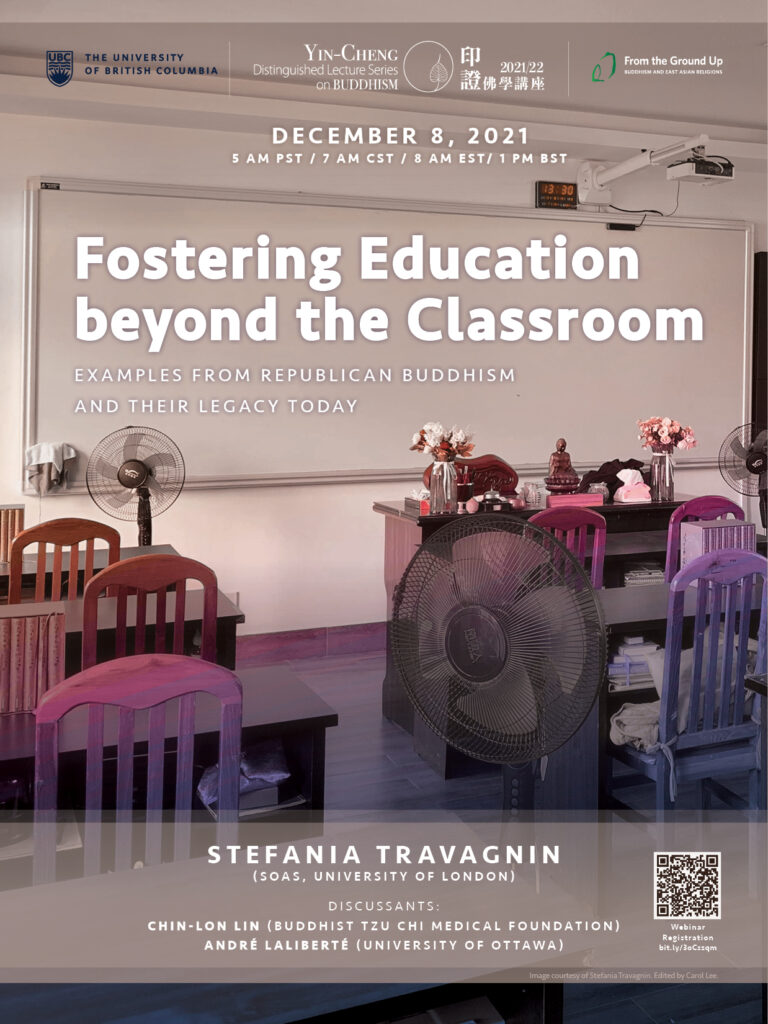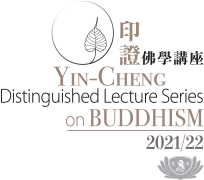Dr. Stefania Travagnin’s lecture in English
Dr. Stefania Travagnin’s lecture in Chinese
Time: Wednesday December 8, 2021 – 5:00 am PST/ 7:00 am CST/ 8:00am EST / 1:00 pm BST
Abstract: The domain of ‘Buddhist education’ makes a distinction between education for the Sangha and Buddhist learning for the lay believers. In the context of education within/for lay society, Buddhist monastics and lay intellectuals did more than simply lecturing the laity about doctrinal principles and practice. For instance, in both the pre-modern and modern China, they have offered elementary and non-religious teaching whenever and wherever public schools were not available; Buddhist institutions also served, sometimes, as the only providers of education for certain social groups, especially women; and they have functioned as examples of private learning and models for other forms of institutions like the Confucian academies (shuyuan 書院) in the premodern era. In consideration of the positive guidance that Buddhist ethics could have offered, Chinese monastics have also been called to teach in other venues, like military camps or prisons. Finally, besides formal lecturing, Chinese monastics have often inspired by example, and facilitated the development of the surrounding community through their leadership, continuous guidance, and practical initiatives. Multiple, then, have been the ways in which Buddhists could intervene in society and educate, offering forms of learning that very often have gone beyond the traditional format and the classroom.
This talk will address Buddhists as educators in the larger society, exploring several cases from the first half of the twentieth century. It will continue showing that this engagement in society have continued after the Republican period and is still visible today, although in a different format due to a new socio-historical context. The talk will end with reflections on further potentials for Buddhists as educators in the twenty-first century.
About the Speaker: Dr. Stefania Travagnin currently teaches at SOAS, University of London. Before joining SOAS she was the founding director of the Centre for the Study of Religion and Culture in Asia at the University of Groningen (2013-2020). Travagnin obtained a BA and MA in Chinese Studies from Ca’ Foscari University (2000), and a PhD in the Study of Religions from SOAS (2009); she has done extensive fieldwork research among Buddhist communities in mainland China and Taiwan, and was visiting scholar in several institutions such as Academia Sinica, the Centre for Chinese Studies in Taipei, the Institute of Religious Studies at Sichuan University and the Graduate Institute of Religious Studies at Cheng Chi University. Her research and publications analyze several aspects of Buddhism and Buddhists in modern China and Taiwan, including life and writings of the monk Yinshun 印順 (1906-2005), meanings of Renjian Fojiao 人間佛教, conceptual and institutional history of Sangha education, history and practice of Buddhist nuns in Republican China and Taiwan, reception history of traditional texts and values in the modern era, Buddhist adoption of media and artificial intelligence. Her publications include the edited volumes Religion and Media in China (Routledge 2016), and the three-volume series on concepts and methods for the study of Chinese religions published by De Gruyter (2019-2020): Concepts and Methods for the Study of Chinese Religions I: State of the Field and Disciplinary Approaches (co-edited with André Laliberté), Concepts and Methods for the Study of Chinese Religions II: Intellectual History of Key Concepts (co-edited with Gregory Adam Scott), Concepts and Methods for the Study of Chinese Religions III: Key Concepts in Practice (co-edited with Paul R. Katz). She is now co-directing, with Elena Valussi, the research project ‘Mapping Religious Diversity in Modern Sichuan’, which is funded by the CCKF and offers the very first comprehensive study of modern religious history of Sichuan.
Discussants: Chin-Lon Lin (Buddhist Tzu Chi Medical Foundation), Dr. Ming-Nan Lin (Buddhist Tzu Chi Medical Foundation), André Laliberté (University of Ottawa)
Dr. Chin-Lon Lin is the CEO of the Buddhist Tzu Chi Medical Foundation and the CEO of the Tzu Chi International Medical Association (TIMA). Dr. Lin has inspired many in the health sector as a driver of environmental responsibility. He has over 50 publications in the field of cardiovascular diseases, vegetarian nutrition, and hospital management, and several books about plant-based diets and disease, health, environment and soul. Dr. Chin-Lon Lin is dedicated to convening a broad coalition of local government, civil societies, hospital systems and medical professionals to transform from environmental hazards to environmental stewardship.
Dr. Ming-Nan Lin is currently the Vice Superintendent at Dalin Tzu Chi Hospital, Tzu Chi Medical Foundation, Taiwan. He has a master degree in Public Health and devoted himself to community outreach and international disaster relief. He is also an assistant professor of Tzu Chi University in Hualien Taiwan who promotes health with a holistic approach. As a family medicine practitioner for more than 25 years, he’s passionate about promoting plant-based diet as the best choice for both enhancing health and protecting the environment. He is also in charge of the green hospital programs in Dalin Tzu Chi Hospital, which won the 2013 International Environment-Friendly Hospital Team Work Best Practice Award by Health Promoting Hospital International Network and gold medal in leadership of Health Care Climate Challenge 2020 by Global Green and Healthy Hospital Network. As the President of Taiwan Vegetarian Nutrition Society and chair of the Task Force on Health Promoting Hospital & Environment (WHO-CC), he aspires to see hospitals achieve the goals of health and environmental protection. He emphasized that doctors should cherish their ability to help others. When everyone does a little more, there will have be an opportunity to change the world.
Dr. André Laliberté is Professor at the School of Political Studies and Co-Director of the Research Chair in Taiwan Studies at the University of Ottawa. His research interests include the role of religions in the shaping of social policies in East Asia and state-religion relations in Chinese societies. His books Religion and China’s Welfare Regimes: Buddhist Philanthropy and the State, and Chinese Religions and Welfare Regimes beyond the PRC: Legacies of Empire and Multiple Secularities will be published by Palgrave in 2021 and 2022.
About the Yin-Cheng Distinguished Lecture Series
Launched in September 2021, the Yin-Cheng Distinguished Lecture Series (印證佛學傑出學術系列講座) is a collaborative, multi-university partnership between Peking University, Columbia University, Princeton University, Harvard University, University of British Columbia, University of Oxford and University of Cambridge. The Lecture Series is established in honour of Venerable Cheng-yen 證嚴, founder of Tzu Chi, and her mentor Yinshun 印順 (1906–2005), with the goal of promoting topics in Buddhist studies.











